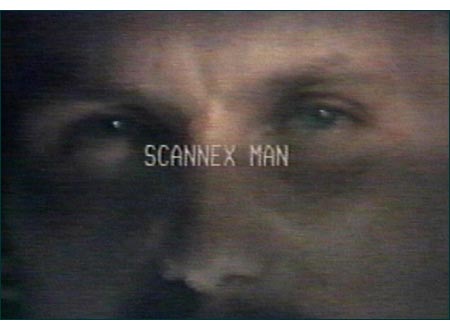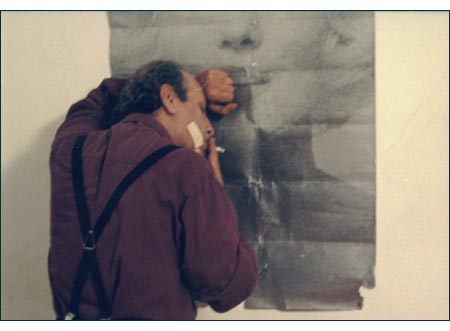
Video Mundi Program 8
DOMESTIC INSOMNIA
Curated by Florian Wuest, Berlin/Rotterdam,
Sponsored by Goethe Institut Inter Nationes
Friday, April 22 8:00pm at the Chicago Cultural
Center
Saturday, April 24 4:00pm at Heaven Gallery
Domestic Insomnia explores the thin line between two fundamental human feelings: fear and attraction. Not just since terrorist attacks succeed to penetrate the emotional framework of Western societies and "shock and awe" campaigns serve as a military response - both broadcasted live on TV -, these personal feelings are more political than one might refuse to believe. They are reliable companions due to the irrational nature of the human psyche, and play an historical role in media strategies, economical profit-making and national security policies. Catastrophe and spectacle are two sides of the same medal, and technological progress worked to enhance this ambivalent relation.
In the program, the political and cultural dimension of the issue is matched with poetic registrations, personal narratives and somber fantasies. Combining video art, animated drawings and experimental film, Domestic Insomnia aims to generate a kind of scratchy suspense in the cinema space. So watch out too for roaming sounds and images!
Emily Richardson UK
Nocturne, 2002, 5 min.
Nocturne is shot entirely at night in deserted streets
around the East End of London and Docklands as there is a feeling of an
echoic city filled with shadows that manifests itself there at night.
Long exposures and timelapse techniques give the film an intensity of
colour and a sense of fleeting or historical time. On these forgotten
streets the sounds of night puncture the silence with more frantic, desperate
outbursts and the silence becomes an active element.
John Watt USA
Scannex Man, 1981, 6 min.
The video is part of John Watt's Industrial Track series
designed around electronically controlled surveillance systems and their
controllers. In Scannex Man, Gordon Wahn, a representative of "Scannex
Industries", is an expert in the marketing of domestic security systems.
Here he describes the various applications of surveillance technology.
Andreas Wutz D
Le Mans, 2003, 9 min.
Le Mans is an experimental film about the ambient feeling
of fear and excitement, experienced during the nocturnal loneliness of
the 24 hours race of Le Mans, France. The night shots are combined with
the asynchronically edited sounds of the racing cars and associated with
pictures of Charles Lindbergh's transatlantic airplane or citations of
Saint-Exupéry's 'Vol du Nuit'.
Jean-Claude Bustros Canada
Zero Gravite, 1990, 28 min.
Around the suspense and paranoia created by the leitmotif
of a possible car accident, the film refers to entropy (disorder) and
its opposite (structuralism) two universal tendencies that can be characterized
by construction and, at the same time, destruction. Built with miscellaneous
archival footage, edited and linked by a disjointed soundtrack, Zéro Gravité
leads the spectator to numerous queries through implicit tracks.
Babak Afrassiabi NL
Defense de savoir, 2000, 4 min.
Defense de savoir shows an domestic orange bird, driven
by anxiety. Something outside the small cage is taking its course. But
what? We don't know. Or do we ever want to know?

Kiarash Anvari Iran
And I Was Born To Sweet Delight, 2000, 14 min.
On Kiarash Anvari's 23rd birthday, a stranger leaves
a message on the answering machine announcing a surprise. It is a package
containing sounds and images from a long time ago, the time of November
1977, two years before the revolution.
Ann Course and Paul Clark UK
Waiting for Waste, 2000, 3 min.
In their videos, Ann Course and Paul Clark animate
simple but startling stream-of-consciousness drawings to make visual puns
on mating, parenthood, artistic production and female desires always
along the edge of hilarious cruelty. In this series, Ann and Paul are
at the pipe waiting for waste.
Aleesa Cohene Canada
All Right, 2003, 7 min.
Using diverse found footage sources including training
videos, emotive gestures from horror films and sound clips from news broadcasts,
All Right poses questions around Immigration Canada's white hegemony and
its fear of the "unknown" and collective expressions of apathy vis-à-vis
policy making. The video paints a challenging, lyrical portrait of a society
detaching from the complex relations of "mulitculturalism", immigration
and global politics.
Florian Wuest, born 1970 in Munich, is an artist, filmmaker and curator for experimental film and video art. He studied Fine Arts at the Braunschweig School of Arts and participated in the Master of Arts Programme of the Piet Zwart Institute, Willem de Kooning Academie, Rotterdam. His curatorial projects include: real[work], in collaboration with Marcel Schwierin, 4th Werkleitz Biennial (2000), Catastrophe, 48th International Short Film Festival Oberhausen (2002), Alternative Histories of Modern Conflict, Impakt Festival, Utrecht, Imperial War Museum and Lux, London (2003), and Ecstatic Bodies, Independent Film Show 3rd Edition, E-M Arts/Fondazione Morra, Napoli (2003).